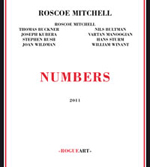|
|
 |
Dusted Reviews
Artist: Roscoe Mitchell Album: Numbers Label: RogueArt Review date: Mar. 20, 2012 |

|
|
|
 |
The French RogueArt label presents a disc of saxophonist and composer Roscoe Mitchell’s more traditionally “classical” solo and duo works. In doing so, they add to the catalogue of similar compositions heard on labels such as Lovely Music and Mutable Music. Liner note writer Bill Schumaker spends much of his allotted space arguing that Mitchell’s chamber music should be reevaluated by those who dismiss it as somehow stylistically inauthentic. Yet, despite gorgeous performances and excellent composition, I am one of those evaluators who feels an acute disconnect when listening to this set of pieces.
The performances could not be more committed. Each brims with vigor and is flawlessly executed. Listen to the dynamic playing of Vartan Manoogian and Joan Wildman on “9/9/99” to get a flavor for the performance quality throughout the disc. They bring out each post-Cage-ian space and Messiaen-esque harmony in the face of extremely virtuosic writing. The clusters and hyper-linear narratives of Stockhausen are also evoked in bursts of activity surrounding moments of repose. Equally stunning is Hans Sturm’s huge registral gamut as he navigates the complicated bass part in “Sketches.” Mitchell’s long-term and highly successful collaborative partnership with baritone Thomas Buckner is also represented in a series of songs whose syntax and melodic lines can be surprisingly tonal, at times even reminiscent of Brahms or Hugo Wolfe. Mitchell only plays on one track, a duo with percussionist William Winant, who is also granted solo time on the disc.
While all of the music is expertly composed, this is not the Roscoe Mitchell to which I will return. When Mitchell wrote for the Transatlantic Art Ensemble recordings, released by ECM several years ago, I heard elements of these same composers in the context of a compositional framework that was Mitchell’s own. I also remember a Vision festival set from 2007 (also including Buckner) in which modern classical music was a factor, but only a single factor, comprising a few strokes on a larger canvas. His solo set for Mutable is also pluralistically adventurous, bypassing “jazz” and “classical” music in a way that is creative and satisfying. The case could certainly be made that these chamber compositions constitute another aspect of Mitchell’s art, or of his artistic voice. Many may find them beautiful and moving. I find it difficult to bypass their overly derivative nature, and I wonder why the mastermind behind Sound should feel the need to take this metaphorical step backward from the music history he helped create.
By Marc Medwin
|







